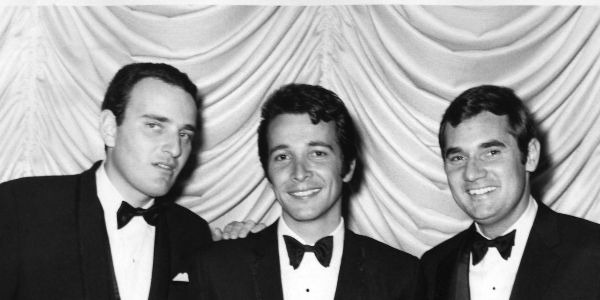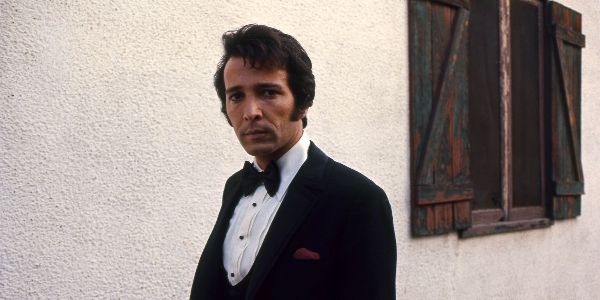HERB ALPERT IS… More Than a Man and His Trumpet

Tynan loves nagging all his friends to watch classic movies…
Between Allan Sherman’s “Hello Muddah, Hello Fadduh” and Herb Alpert’s “The Lonely Bull,” I was able to terrorize my sister to no end. This first song is self-explanatory. It’s fashioned as a humorous novelty. The second one isn’t as obvious. In fact, it had nothing to do with the quality of the song itself but more so the screeching octave of my adolescent voice caterwauling with gleeful abandon.
Even though I grew up generations after his most towering successes, there’s something so ubiquitous about the music of Herb Alpert and The Tijuana Brass. I don’t think I realized at that early age what a global phenomenon he was or the fact he was part of the team behind other formative sounds like The Carpenters and Sergio Mendes & Brazil ’66.
I’m not even sure I could name many (if any) of his tunes. Because this was one young fan unaccustomed to pop songs without lyrics to be inculcated in my mind’s eye and, therefore, remembered. Still, Herb Alpert didn’t need them, and it’s not due to any lack of vocal ability.
He could sing, but he put his pipes to other uses, now synonymous with one of the most recognizable sounds of all-time. He made lasting tunes – catchy and upbeat but singular – there’s something unmistakable about them, staying with you and probably making you happy. It’s in their very DNA. I sure never forgot them.
Beyond A Title
Herb Alpert is… at times falls back on pronouncements that are a bit obvious and, dare I say, forced. What are all these congratulatory words but rather arbitrary plaudits from fans and friends alike? They might easily apply to most any artist or any successful talent who has ever lived.
But what’s not to be discounted is the indelible career Herb Alpert made for himself, and in spite of its cutesy title, Herb Alpert Is… does attempt to flesh out the multi-faceted extent of his talents: then and now. Amid some snazzy title direction, we are privy to the breadth of his art, ranging from his famed trumpet to sculpture, and even painting. More on that later, but for now we must examine the man himself.

In his youth, he was an introvert, but music gave him a voice; it was his mouthpiece of self-expression, and it helped that his mother was in his corner when it came to encouraging him to practice. In high school, he won a talent battle on TV, but it was in the military where he came into his own. At the very least, he gained a reality check. Instead of mimicking Louis Armstrong, Harry James, or Miles Davis, he realized he needed to cut his own path. He needed to play like Herb Alpert.
One of his other formative progressions was joining Kean Records as a staff writer alongside another up-and-comer named Lou Adler. Together they worked behind the scenes with iconic artists like Sam Cooke. It’s illuminating to hear Alpert‘s own rumination on the great soul singer. He came away with this: “It ain’t what you do, it’s the way how you do it.” Because he saw Sam Cooke spin corny lyrics into something magical. It was never about technical perfection; it’s all about a feeling. Cooke was skilled at imparting this feeling to his audience.
What’s in a Name?
Another auspicious chapter in Alpert‘s career was starting A&M Records with Jerry Moss, carrying over his impetus to put the artist first. The documentary makes it clear Alpert never got that in his early days at the “medicinal” RCA Victor, which made him decide that if he ever had a record company, it would always revolve around the talent. They repurposed Charlie Chaplin‘s old lot and made it their new home. Taking stock of their wealth of musicians is pretty staggering. They had such an eclectic stable of artists: The Carpenters, Quincy Jones, Joe Cocker, and The Police just to name a few.
But even as some of these musicians were extremely lucrative, A&M earned its successes by bucking trends and releasing what was not on the radio. Alpert and his partner cultivated what felt much more like a family atmosphere. However, even as he surrounded himself with such a community and garnered so much acclaim, it didn’t always signal continuous happiness for Alpert. This included his own musical career.
In a modern landscape where instrumental best selling singles are almost unheard of, Herb Alpert managed to become king by that very avenue, and he created his own sound, utilizing overdubbing techniques, and gleaning initial inspiration from a Tijuana bullfight.

His unparalleled success is put into perspective quite quickly when we realize, in 1965-66, he sold more records than The Beatles! He was the American Dream come true – a quietly charismatic pop hero – and his songs even orbited the earth with the Apollo 8 missions. It’s true that his music threads through the fabric of a generation. Although, in his own words, he was “rich, famous, and miserable.” He’s not the first to feel numbed and disillusioned by superstardom.
If you were to hone in on a defining moment, consider the anecdote where Alpert put on a party for his friends in L.A. Lani Hall was among the guests, as she and Sergio Mendes had toured with him. He showed off his new remodel, and she saw right through it. It just wasn’t him.
Suddenly, we realize the burying of the lede – this isolated story takes on so much import and becomes a symbolic moment signifying the trajectory of Alpert‘s life thus far. In fact, he breaks up a bit remembering it. Because it was one of his lowest points. He lost himself in all the white noise and distraction – this quiet boy from Melrose Elementary who came alive through the trumpet – and he literally lost his voice. In a later funk, it got so bad he couldn’t play, literally losing the thing that brought him the most joy and satisfaction.
To consider Herb Alpert as an entity and a phenomenon is even strange for the man himself; it’s almost an out of body experience, having taken on a life of its own on radio and television. Because people know the commodity “Herb Alpert,” even if they don’t know the man. It brings to mind that quip of Cary Grant‘s, “Even I’d Like to be Cary Grant.” Thankfully, Alpert had Lani Hall to know who he was and to love him unconditionally, whether he could play music or not. They’ve been married since 1973 and eventually, the trumpet came back. Eventually, it was life-giving again.
Conclusion: Herb Alpert Is…
In our current climate, it would easy to cry afoul of cultural appropriation because Herb Alpert certainly built an image and a style out of a below-the-border milieu. But he also synthesized many sounds together and championed artists from all over the spectrum.
What becomes even more apparent is his humility and his generosity of spirit, extended wholeheartedly towards others. He’s the first to acknowledge how much he was blessed, first by music as a boy, and then with material wealth. However, instead of resting on his laurels and holding onto his riches, he’s invested it into the next generation of youngsters.

In considering an epithet for Alpert, I quite like the words of one of his friends: “The man with a golden horn with a golden touch and a heart of gold.” It’s certainly a poetic acknowledgment. However, I don’t think there’s a greater compliment than all those little kids (and their parents) surrounded by his music. Others were provided the means to pursue music for their own edification thanks to his support. That has meaningful implications. I’m no musician, but I can relate.
Somehow hearing “The Lonely Bull” over the credits took me back to my own childhood again. Now I know it by name, but it was the palpable buoyancy – the joy and feeling of the music itself – that has always stayed with me. It’s just so catchy. Surely it speaks to something in this often fickle, cynical world we slog through on a daily basis. A joyful noise and humility can go a long way. Herb Alpert was armed with both.
Do you have any experience with Herb Alpert? What do you know about his life & career? Please let us know in the comment below.
Herb Alpert Is… will be released in theaters and on VOD on October 2nd.
Watch Herb Alpert Is…
Does content like this matter to you?
Become a Member and support film journalism. Unlock access to all of Film Inquiry`s great articles. Join a community of like-minded readers who are passionate about cinema - get access to our private members Network, give back to independent filmmakers, and more.
Tynan loves nagging all his friends to watch classic movies with him. Follow his frequent musings at Film Inquiry and on his blog 4 Star Films. Soli Deo Gloria.













